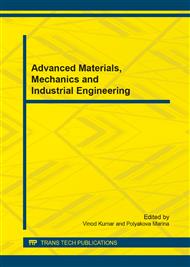[1]
L.A. Zadeh L.A. Fuzzy Sets / Information and Control, vol. 8, 1965, p.338–363.
Google Scholar
[2]
Y.M. Ali, L. Zhang. A Methodology for Fuzzy Modeling of Engineering Systems / Fuzzy Sets and Systems, vol. 118, 2001, pp.181-197.
DOI: 10.1016/s0165-0114(98)00272-3
Google Scholar
[3]
Mendel J.M., Mouzouris G.C. Designing Fuzzy Logic Systems / IEEE Transactions on Circuits and Systems, vol. 44, 1997, no 11, p.885– 895.
DOI: 10.1109/82.644042
Google Scholar
[4]
Zavala, A.H., Nieto O.C. Fuzzy Hardware: A Retrospective and Analysis / IEEE Transactions on Fuzzy Systems, vol. 20, 2012, pp.623-635.
DOI: 10.1109/tfuzz.2011.2181179
Google Scholar
[5]
S. Khan, U. Kulkarni. Design and implementation of Fuzzy logic controller for a DC motor / International Journal of Emerging Technology and Advanced Engineering, vol. 2, issue. 8, 2012, pp.372-375.
Google Scholar
[6]
Verma, H. Gupta. Fuzzy Logic Based Water Bath Temperature Control System / International Journal of Advanced Research in Computer Science and Software Engineering, vol. 2, issue 4, 2012, pp.333-336.
Google Scholar
[7]
Chaudhari, P.G. Khot. Fuzzy Modeling in Industry for the Optimal Use of Available Resources / Advances in Fuzzy Mathematics, vol. 5, issue 2, 2010, p.121.
Google Scholar
[8]
Semenyuk. Applying of Fuzzy Logic Modeling for the Assessment of ERP Projects Efficiency / Proceedings of the 9th International Conference on ICT in Education, Research and Industrial Applications: Integration, Harmonization and Knowledge Transfer. Kherson, Ukraine, June 19-22, 2013, pp.393-400.
Google Scholar
[9]
G. Castellano, C. Castiello, A.M. Fanelli, C. Mencar. Knowledge discovery by a neuro-fuzzy modeling framework / Fuzzy Sets and Systems. Volume 149 Issue 1, January, 2005, pp.187-207.
DOI: 10.1016/j.fss.2004.07.015
Google Scholar
[10]
C. Li, F-T. Chan. Knowledge Discovery by an Intelligent Approach Using Complex Fuzzy Sets / Lecture Notes in Computer Scienc, vol. 7196, 2012, pp.320-329.
DOI: 10.1007/978-3-642-28487-8_33
Google Scholar
[11]
Mamdani E.H. Application of Fuzzy Logic to Approximate Reasoning Using Linguistic Synthesis / IEEE Transactions on Computers, vol. 26, 1977, p.1182–1191.
DOI: 10.1109/tc.1977.1674779
Google Scholar
[12]
T. Takagi, M. Sugeno. Fuzzy Identification of Systems and Its Application to Modeling and Control / IEEE Transactions on Systems, Man and Cybernetics, Vol. 15, 1985, pp.116-132.
DOI: 10.1109/tsmc.1985.6313399
Google Scholar


